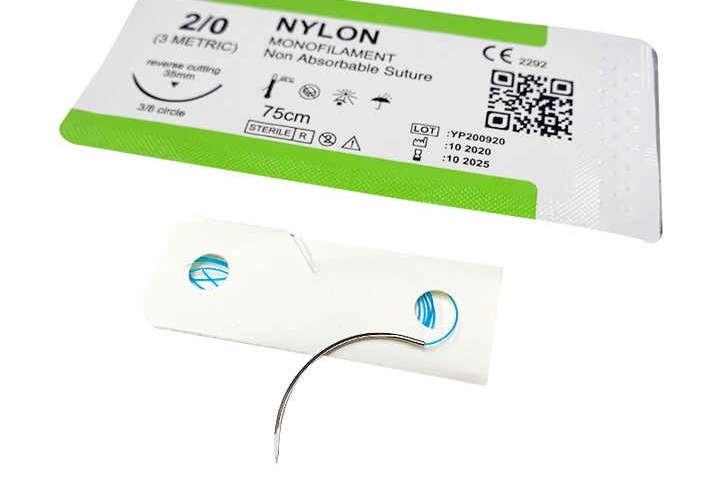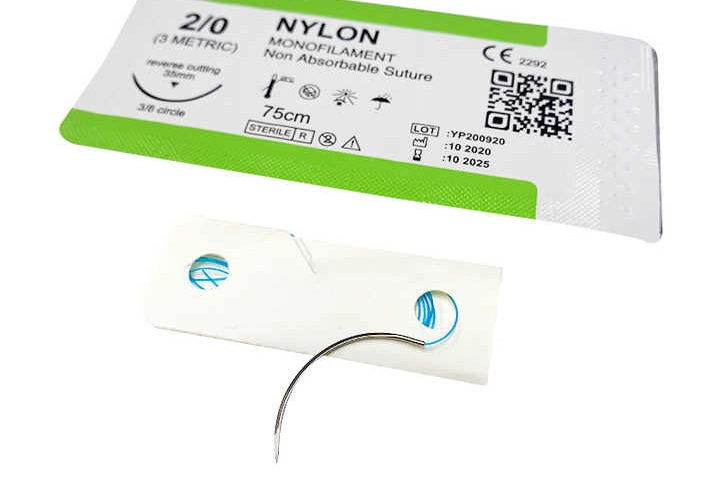
Definition and Purpose of Dental Sutures
Dental sutures are special threads used in mouth surgeries to close cuts or wounds. They help your mouth heal by holding tissues together. They cut down bleeding and keep infections away. These threads are a big part of recovering from dental surgery. They make sure everything stays lined up for a smooth healing process.
Types of Dental Sutures Used in Dentistry
Dental sutures come in a few different kinds in medical sutures for surgery. They’re sorted by what they’re made of and whether they dissolve on their own. Absorbable sutures, like ones from polyglycolic acid or catgut, melt away in your body over time. Non-absorbable ones, like silk or nylon, need to be pulled out after healing’s done. The kind picked depends on the surgery and what you need.
Procedures Involved in Dental Suturing
Preparation Before Placing Dental Sutures
Tools and Stuff Needed
Suturing in dentistry needs specific gear to be precise and safe. You’ll need needles, needle holders, scissors, and forceps. The suture thread itself is key too. Other things like gauze pads, antiseptic liquids, and numbing shots are also super important.
Keeping Things Clean and Prepping the Patient
Keeping everything germ-free is a must to avoid infections. All tools get cleaned thoroughly with autoclaves or special disinfectants. The patient’s mouth gets washed with an antiseptic solution to knock out bacteria. A numbing shot is given to keep you comfy during the process.
Techniques for Placing Dental Sutures
Common Ways to Suture in Dentistry
Dentists use different stitching tricks depending on the wound. Simple interrupted sutures are popular. They’re easy to put in and take out. Continuous sutures spread tension nicely and work great for bigger cuts. Mattress sutures, either horizontal or vertical, pull wound edges super close. They’re perfect for spots under a lot of strain.
Step-by-Step Guide to Putting in Sutures
- Pick a Needle: Choose the right needle size and shape for the surgery spot.
- Thread It: Hook the suture thread to the needle securely.
- Poke Through: Push the needle into one side of the tissue at a 90-degree angle.
- Cross Over: Pull the needle through both sides of the wound.
- Tie a Knot: Make a tight knot, like a square knot or surgeon’s knot.
- Trim Extra: Snip off leftover thread to avoid annoying the mouth.
- Double-Check: Make sure stitches are even and not pulling too hard.
Post-Suturing Care and Removal Process
Tips for Aftercare
After getting sutures, follow these tips to heal well:
- Don’t poke or mess with the stitched area.
- Keep your mouth clean with gentle antiseptic mouthwash rinses.
- Skip hard or spicy foods that could irritate the spot.
- Take any meds, like antibiotics or painkillers, as your dentist tells you.
How to Take Out Dental Sutures
Non-absorbable sutures need a pro to remove them once you’re healed:
- Check Healing: Look at the wound to see if it’s ready for stitches to come out.
- Clean Up: Use an antiseptic solution to keep germs away.
- Snip Stitches: Cut each suture loop near the knot with sterile scissors.
- Pull Them Out: Gently tug out each thread with forceps. Keep it comfy.
- Final Peek: Check for leftover bits or signs the wound’s not fully healed.
Dental suturing is a vital aspect of oral surgery that ensures proper wound closure and facilitates recovery while minimizing complications such as infection or tissue misalignment.
Benefits of Using Dental Sutures
Helping Healing After Mouth Surgery
Dental sutures are a big deal for healing after oral surgeries. These threads hold tissues together. They keep wound edges close for better recovery. This cuts the chance of wounds splitting open or healing slowly. Sutures also stop bleeding. This helps tissues grow back right. Absorbable sutures, like polyglycolic acid ones, dissolve on their own. That means no extra trip to get them out, which is awesome for patients.
Sutures also protect the surgery spot from stuff that could mess up healing. This is super important in the mouth, where things move a lot. Good stitches speed up healing and make results better.
Keeping Infections and Problems Away
Sutures are great at stopping infections and other issues. By closing wounds tightly, they keep bacteria out. This is key in mouth surgeries, where saliva and food bits can cause trouble. Sutures keep the area clean by blocking debris.
Non-absorbable sutures, like silk or nylon, are used when the wound needs support for longer. They stay put until the tissue’s healed, then get taken out. The suture choice depends on the surgery and what you need.
Clean tools are a must to avoid infections. Everything gets sterilized with autoclaves or disinfectants. Patients should stick to aftercare tips, like rinsing with antiseptic solutions and avoiding stuff that could hurt the wound.
Supporting Mouth Structure and Function
Dental sutures help keep your mouth’s shape and function after surgery. They hold soft tissues steady to keep everything in place. This is key for normal mouth use. It’s especially critical in surgeries with lots of tissue work or rebuilding.
For example, mattress sutures pull wound edges together tightly in tense spots. They help healing and cut down on scarring or weird tissue changes. Continuous sutures spread tension evenly across bigger cuts. This lowers the chance of tissue damage.
Sutures also help grafts or implants stay put until they settle in. This is super important for long-term wins in things like bone grafts or implants.
Plus, sutures make you more comfy by cutting pain from open wounds. They let you get back to normal life faster while keeping your mouth working right.

Medco, a professional supplier of medical instruments with over 18 years of experience, offers a comprehensive range of high-quality dental sutures designed to meet diverse clinical needs. Our products are manufactured under strict quality control systems and are certified by CE0123 & ISO13485 certificates & FDA standards. Whether you require absorbable or non-absorbable options, Medco provides reliable solutions tailored to your specific requirements.
Medco is dedicated to doing great work. This means every product gets thoroughly tested before it’s sent out. This guarantees top performance and safety.
Medco supplies over 130 countries around the world. It also works with more than 3,000 customers globally. Medco is now a trusted partner in the medical industry.
By choosing Medco’s dental sutures, you gain access to:
- Competitive pricing—8-30% lower than other suppliers.
- Prompt delivery with rapid prototyping capabilities.
- Customizable packaging options tailored to your preferences.
- Expert customer support available 24/7 for all inquiries.
For inquiries or orders, contact Medco, located at G2-14946 Yiwu International Trade City. Our dedicated team is ready to assist you with enthusiasm and quality service to ensure your satisfaction with our products.
FAQ
Q: Does getting stitches in your mouth hurt?
A: Your dentist gives you numbing shots first. So you won’t feel much while they stitch you up. You might notice a little pull or pressure. Usually, it’s not a big deal. Worried about pain? Tell your dentist. They can make you more comfortable.
Q: How soon do mouth stitches disappear?
A: That changes based on the stitch type. Stitches that dissolve on their own break down in about 1 to 3 weeks. This happens while your mouth heals. These are often made from materials like polyglycolic acid.
Other stitches don’t dissolve. These include silk or nylon ones. Your dentist will need to take these out. Usually after 7 to 14 days.
Q: Who actually needs mouth stitches?
A: You might need them if you’ve had:
- A tooth pulled
- Dental implants
- Gum surgery
They’re also helpful for closing cuts or wounds in your mouth. This helps healing. If your surgery is complex, your dentist will decide if stitches are right for you.




